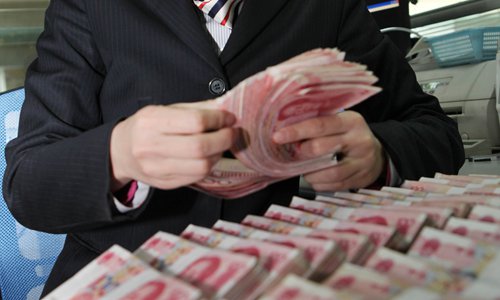HOME >> SOURCE
China most likely to increase deficits to over 3% in 2020: experts
By Chu Daye Source:Global Times Published: 2020/3/28 16:38:40

An employee counts yuan banknotes at a bank in Ganyu, East China's Jiangsu Province. File photo: IC
China will most likely raise its fiscal deficits to over 3 percent of its GDP, breaking a technical "red line," experts said on Saturday, as the country for the first time mentioned increasing its fiscal deficits as a way to ward off the negative economic impact of the COVID-19 amid rising calls from economists.
The comment came as a meeting of the Political Bureau of the Communist Party of China's Central Committee on Friday made new arrangements on coordinating the COVID-19 response and economic and social development.
A package of macro policies and measures will be introduced, the meeting noted, and China will "appropriately raise the fiscal deficit ratio" and issue special treasury bonds, among other measures.
The meeting took place right after a video conference of the leaders of the Group of 20 countries on Thursday, which vowed to inject more than $5 trillion into the global economy to cushion the fallout of the COVID-19 pandemic. China is anticipated to soon announce more concrete measures to stimulate its slowing economy.
Existing measures aside, a domestic news portal said the notion of using fiscal deficits and special treasury bonds to combat COVID-19 is the first of its kind.
In 2019, China lifted its fiscal deficit target to 2.8 percent of GDP, up 0.2 percentage points from 2018.
Previously, there had been calls from Chinese economists to raise the deficit level to between 3-4%. If the deficit level is raised to 3.5%, the government will have an extra 700 billion yuan ($98.64 billion) to spend.
Xu Hongcai, an economist at the China Centre for International Economic Exchanges, told the Global Times on Saturday that the money should be used to protect Chinese people's livelihood and keep the economic machine humming.
"But the actual figure is hard to tell, given an already stretched account and sizable declines in fiscal revenues in 2020 due to the pandemics," Xu said.
Last year, only a few localities were able to stay afloat on the balance sheet by their own means, with the rest requiring the central government's help.
Although the Chinese government is better positioned to accommodate more spending, Xu said the hike must be appropriate as any gap caused by the deficit will eventually be passed on to the vast taxpayers in China.
In 2019, China's fiscal revenue grew by 3.8 percent to 19.04 trillion yuan while fiscal spending grew by 8.1 percent to 23.89 trillion yuan. The budget gap stood at 4.85 trillion yuan, up nearly 30 percent from the 2018 level.
However, other economists are also lobbying for a steeper hike in the deficit, calling for extraordinary measures in this "wartime-like" situation.
Liu Feng, chief economist at China Galaxy Securities, said the Chinese government should lift deficits of up to 5 percent, due to its relatively low level of government debt.
"The world is fighting the coronavirus pandemic. Many of the measures taken against the virus' spread are upending business norms, causing businesses and labor to lose the ability to generate income," Liu said.
Liu said the extra money gained from raising the deficit should be immediately spent in pandemic-stricken areas to help them regain the ability to generate revenues, and should not be used on infrastructure or research programs that have a long-term pay-off.
Liu said the money can be spent by handing out vouchers to Chinese citizens, which is better than directly giving money to spur consumption.
"We are in an unprecedented situation where a global health pandemic has turned into an economic and financial crisis," said IMF Managing Director Kristalina Georgieva on Friday.
So far, China has implemented fiscal and monetary measures worth $344.1 billion to fight COVID-19 and stabilize the economy, including more than 121 billion yuan ($17 billion) in epidemic prevention and control and expected whole-year tax and fee reductions of more than a trillion yuan, according to a Foreign Ministry press conference on Friday.
Posted in: ECONOMY